 A new study in mice by UC Davis scientists has revealed a complex molecular process of gene activation in neurons that plays a critical role in memory :
A new study in mice by UC Davis scientists has revealed a complex molecular process of gene activation in neurons that plays a critical role in memory :
The authors of the paper studied beta-2 adrenoceptors , which are present in various cell types throughout the body, including nerve cells in the hippocampus region of the brain. When the beta-2 adrenergic receptors are activated, in a few molecular steps they stimulate the nucleus of the neuron to give a signal for the release of the enzyme phosphodiesterase y (PDE4D5) . Previous research has already shown that PDE4D5 plays a role in learning and memory . The crucial step in the activation of the gene signaling the release of PDE4D5 is the attachment of a phosphate group to the receptor:
This is accomplished by an enzyme called kinase a . In mice that had the work of this enzyme turned off, memory turned out to be very poor. The animals developed an early stage of Alzheimer’s disease . However, when the memory-impaired mice were given a PDE4D5 analogue drug , their ability to learn and retain memories increased. “Gene expression forms the material basis of memory in the brain ,” explained study leader Yang Xiang. The study was published in the journal Science Signaling
#brain #mind #memories









